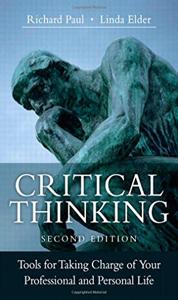
Want to learn the ideas in Critical Thinking better than ever? Read the world’s #1 book summary of Critical Thinking by Richard Paul, Linda Elder here.
Read a brief 1-Page Summary or watch video summaries curated by our expert team. Note: this book guide is not affiliated with or endorsed by the publisher or author, and we always encourage you to purchase and read the full book.
Video Summaries of Critical Thinking
We’ve scoured the Internet for the very best videos on Critical Thinking, from high-quality videos summaries to interviews or commentary by Richard Paul, Linda Elder.
1-Page Summary of Critical Thinking
Thinking and Change
The world is changing at a rapid pace and it’s becoming increasingly difficult to make decisions. Everyone faces new threats from environmental pollution, technology shifts and other phenomena. Critical thinking can help you deal with these changes more effectively by improving your decision making skills. The first step in learning critical thinking is to examine the way you think now – your assumptions, logic, inferences and decision-making abilities. Only those who understand what thinking is are in a position to improve their own thought processes. Excellent thinkers do not merely have outstanding skills; they also have genuine intellectual virtues that complement each other as well as being interdependent on one another for success.
The best way to improve your thinking is to practice. The first step toward practicing is understanding the features of good thinking:
Humility – People who are intellectually humble are aware of their limitations. They don’t let prejudices get in the way of a good idea, and they can accept criticism without feeling threatened by it.
Intellectual courage – Intellectual courage is the ability to change your mind when you encounter better ideas. * Empathy – Empathy allows you to put yourself in someone else’s shoes and see things from their perspective. * Integrity – Integrity means that there is consistency between what you say and what you do, walking the talk, practicing what you preach.
If you don’t persevere, your critical thinking skills will suffer. Critical thinking requires going through layers of complexity to find the truth. * People often lack confidence in reason and think that faith or tradition can provide answers instead.
Autonomy – Autonomy means relying on your own thoughts and ideas. Critical thinking, open-mindedness, and the ability to see other people’s points of view all require autonomy.
Fair-mindedness – Fair-minded thinkers respect all points of view, even if they’re different from their own.
Self-knowledge and Fairness
Critical thinking is essential in today’s world. It can help us understand ourselves better, and it shows us how to be fair-minded. We should learn critical thinking skills, but we also need self-awareness and the determination to seek out the truth by being unbiased.
It takes six stages to develop critical thinking skills.
There are four stages of thinking: 1. Unreflective Thinker – You were born unreflective, and only noticed how you think after being challenged by a problem. 2. Challenged Thinker – When you’re aware of the problem with your thinking, that’s when critical thinking begins to develop in you. 3. Beginning Thinker – Beginners acknowledge the importance of thinking but don’t make any efforts toward bettering their thought process until they reach this stage where they start practicing it regularly. 4. Practicing Thinker – Regular practice is crucial for improvement
If you follow the game plan, then you will be able to make progress.
The Master Thinker – You have developed your critical thinking skills to the point that they are almost automatic.
The Eight Elements of Thinking
Critical thinking requires thoughtful consideration of its components. One component is purpose, which may be conscious or unconscious. Critical thinkers understand their purpose and think accordingly.
- There are four elements in thinking: point of view, assumptions, implications and consequences. Point of view is the frame from which you look at a situation or problem. Assumptions are your presuppositions about that situation or problem. Implications are possibilities that can arise from those situations or problems based on your assumptions (which may be true or false). Consequences are what happens when those implications come to pass (they might turn out good for you, bad for you etc.).





